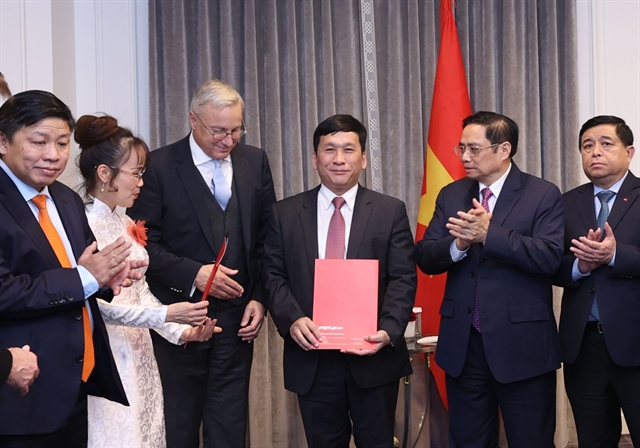 Economy
Economy


|
| Việt Nam's Prime Minister Phạm Minh Chính (5th, left) witnesses Vietjet and Airbus's signing ceremony. — Photo courtesy of Vietjet |
PARIS — Vietjet and Airbus have inked a strategic partnership agreement on the delivery timeline for 119 aircraft of the airline’s existing backlog and cooperation for the development of Vietjet’s wide-body fleet together with other supporting terms for the airline post COVID-19 period.
Both sides have agreed on further support and training for the airline’s technicians and engineers while accelerating Vietjet’s Training Academy development for simulators, safety management programmes, and flight management training.
The agreement was announced during the official visit of Việt Nam’s Prime Minister Phạm Minh Chính and high-ranking dignitaries’ delegation to France.
Vietjet will take delivery and operate up to three leased A330 aircraft in November as part of the airline’s wide-body fleet development plan under its LCC model operation, the airline said in a statement.
"We are pleased to reach this agreement with Vietjet,” said Christian Scherer, Airbus Chief Commercial Officer and Head of International.
“It's another example of how we have worked together with our customers to find solutions to adapt to the impact of the pandemic. With its modern and efficient Airbus fleet Vietjet will be well equipped to benefit from the rebound in air travel in Asia, where we see strong pent-up demand," he said.
“Our cooperation today again acknowledges both parties’ long-term and sustainable relationship, which is now elevated to a strategic and comprehensive partnership. I believe that the add-on of the A330s will surely enhance our fleet’s technical reliability, operational efficiency and flight range to better meet travel demand of our flyers in the future,” Vietjet Managing Director Đinh Việt Phương said.
The agreement also covers a variety of other aspects such as aircraft’s equipment supply and services, comprehensive aviation training, consultation, and development of MRO facilities for Vietjet and in the region together with other initiatives for fuel efficiency and sustainable development. — VNS




